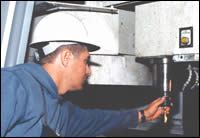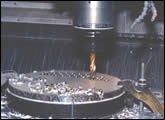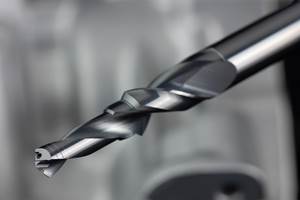Carbide Drill Improves Productivity For Heat Exchanger Manufacturer
After using this solid carbide drill, the company experienced a 250 percent increase in feed rates and a 250 percent jump in speed.
Share





When companies invest in new production equipment, using the hole-making systems that worked well with their previous machinery often produces results that fall short of expectations. Cemline Corporation (Cheswick, Pennsylvania), a manufacturer of heat exchangers for commercial and industrial hydronic heating systems, experienced this problem. After the company purchased a CNC vertical machining center in late 2002 to increase productivity and improve the hole quality of its heat exchanger covers, the production team realized that maximum feed rates—which are essential in optimizing cost savings and increasing throughput—could not be achieved with the tooling used on the original machining center.
To reach its goal, the 50-person production team began exploring alternative drills for applications on stainless steel, brass and pre-machined plate steel heat exchanger covers. The tube sheets, which anchor the heat exchangers’ copper tube bundles, range in diameter from 4 inches to 24 inches and are 1 to 3 inches thick.
By the second quarter of 2003, within 6 months of activating the vertical machining center, the company began to use Dynapoint SE211HP solid carbide drills in grade KC7515 from Kennametal (Latrobe, Pennsylvania).
“The improved feed rates and tool life that we have experienced since making the switch are truly amazing, and the process of changing over to new tooling was much smoother than I thought it would be,” says Lindsay Chappell, Cemline’s owner and president.
The new solid carbide drill has allowed the company to experience a 250 percent increase in feed rates (from 2 ipm to 5 ipm), and a 250 percent jump in speed (from 1,000 rpm to 2,500 rpm).
The modular drill the company used prior to Dynapoint drilled only 200 to 300 holes, or 800 linear inches, before the carbide drill point needed to be replaced. The company can now drill 800 to 1,000 holes, or 2,400 linear inches, with one drill, maximizing time in the cut.
John Weinbrenner, Kennametal standard products engineer, recommended that Cemline develop and use an aluminum support plate on the underside of the exchanger cover to prevent flexing and damp vibration caused by the increased speeds and feeds of the SE211HP. The increased cover rigidity allowed Cemline to make holes in one pass.
The net result is that the company has reduced manufacturing time by 70 to 80 percent.
The productivity improvements that Dynapoint initiated have increased the company’s response time when fulfilling orders for replacement tube bundles, and the 57 percent cost-per-part reduction, from $61.08 to $26.02, has strengthened the company’s competitive edge.
The company also uses the manufacturer’s Blue Box Program, which reconditions drills. Using this program, Cemline sends its spent Dynapoint drills to the reconditioning service, where each drill is restored to factory standards by using the same kind of CNC grinding equipment on which the drills were originally manufactured.
“The Blue Box Program helps us get the most value for our hole-making dollars,” says Jason Chappell, Cemline’s production manager. “Before switching to Kennametal, we were unable to use re-ground drills for hole making in stainless steel and other tough-to-machine materials because those drills lacked the necessary consistency for manufacturing products that met customers’ specifications.”
Related Content
Heule Tool Enables Spot Facing of Difficult-to-Reach Areas
The manually actuated bkac spot facing tool is well suited for large boring mills and other open-air machines.
Read MoreEmuge-Franken's New Drill Geometry Optimizes Chipbreaking
PunchDrill features patent-pending geometry with a chipbreaker that produces short chips to control machining forces.
Read MoreCeratizit Product Update Enhances Cutting Tool Solutions
The company has updated its MaxiMill 273-08 face mill, WPC – Change Drill, as well as the HyPower Rough and HyPower Access 4.5-degree hydraulic chucks.
Read MoreThe Future of High Feed Milling in Modern Manufacturing
Achieve higher metal removal rates and enhanced predictability with ISCAR’s advanced high-feed milling tools — optimized for today’s competitive global market.
Read MoreRead Next
5 Rules of Thumb for Buying CNC Machine Tools
Use these tips to carefully plan your machine tool purchases and to avoid regretting your decision later.
Read MoreBuilding Out a Foundation for Student Machinists
Autodesk and Haas have teamed up to produce an introductory course for students that covers the basics of CAD, CAM and CNC while providing them with a portfolio part.
Read MoreRegistration Now Open for the Precision Machining Technology Show (PMTS) 2025
The precision machining industry’s premier event returns to Cleveland, OH, April 1-3.
Read More



















.png;maxWidth=300;quality=90)















.png;maxWidth=970;quality=90)